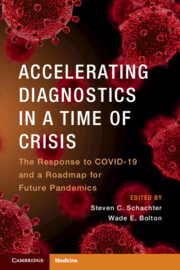 Accelerating Diagnostics in a Time of Crisis
Accelerating Diagnostics in a Time of Crisis Book contents
- Accelerating Diagnostics in a Time of Crisis
- Accelerating Diagnostics in a Time of Crisis
- Copyright page
- Dedication
- Contents
- Contributors
- Foreword
- Preface
- Acknowledgments
- Introduction
- Chapter 1 Early Detection, Response, and Surveillance of the COVID-19 Pandemic Crisis
- Chapter 2 Immunology of COVID-19 and Ineffective Immunity
- Chapter 3 Clinical Management: A Roadmap Based on One New York City Hospital’s Response to the COVID-19 Pandemic
- Chapter 4 Contribution of RADx® Tech to the Rapid Development of COVID-19 Diagnostic Tests
- Chapter 5 Coordination of Resources for the Manufacturing and Deployment of COVID-19 Diagnostic Assays
- Chapter 6 Quality and Risk Management Processes for Diagnostic Assays during an Emergency Pandemic Response
- Chapter 7 Development of Assays to Diagnose COVID-19
- Chapter 8 Laboratory Verification and Clinical Validation of COVID-19 Diagnostic Assays
- Chapter 9 Importance of Timely Sequencing, Tracking, and Surveillance of Emergent Variants
- Chapter 10 The RADx® Regulatory Core and Its Role in COVID-19 Emergency Use Authorizations
- Chapter 11 Commercialization and Market Assessment of COVID-19 Assays
- Chapter 12 Testing Strategies to Mitigate COVID-19 Disease Spread
- Chapter 13 A Pandemic Not Just of Infection but of Inequality: The Social Impact of COVID-19
- Chapter 14 Summary and Path Forward for Future Pandemics
- Index
- References
Chapter 14 - Summary and Path Forward for Future Pandemics
Published online by Cambridge University Press: 06 January 2024
- Accelerating Diagnostics in a Time of Crisis
- Accelerating Diagnostics in a Time of Crisis
- Copyright page
- Dedication
- Contents
- Contributors
- Foreword
- Preface
- Acknowledgments
- Introduction
- Chapter 1 Early Detection, Response, and Surveillance of the COVID-19 Pandemic Crisis
- Chapter 2 Immunology of COVID-19 and Ineffective Immunity
- Chapter 3 Clinical Management: A Roadmap Based on One New York City Hospital’s Response to the COVID-19 Pandemic
- Chapter 4 Contribution of RADx® Tech to the Rapid Development of COVID-19 Diagnostic Tests
- Chapter 5 Coordination of Resources for the Manufacturing and Deployment of COVID-19 Diagnostic Assays
- Chapter 6 Quality and Risk Management Processes for Diagnostic Assays during an Emergency Pandemic Response
- Chapter 7 Development of Assays to Diagnose COVID-19
- Chapter 8 Laboratory Verification and Clinical Validation of COVID-19 Diagnostic Assays
- Chapter 9 Importance of Timely Sequencing, Tracking, and Surveillance of Emergent Variants
- Chapter 10 The RADx® Regulatory Core and Its Role in COVID-19 Emergency Use Authorizations
- Chapter 11 Commercialization and Market Assessment of COVID-19 Assays
- Chapter 12 Testing Strategies to Mitigate COVID-19 Disease Spread
- Chapter 13 A Pandemic Not Just of Infection but of Inequality: The Social Impact of COVID-19
- Chapter 14 Summary and Path Forward for Future Pandemics
- Index
- References
Summary
In the face of a rapidly emerging pandemic, there needs to be a concerted and organized response so that the pandemic can be stopped or slowed and patients can be accurately diagnosed and treated. As we learned with severe acute respiratory syndrome coronavirus 2 (SARS-CoV-2), there was no prescribed roadmap to follow, leaving scientists and clinicians to plan and respond in real time. Although the efforts were heroic in nature, some decisions (if they could be made again) would have been different. In this chapter, we address the lessons learned from the individuals who were on the battlefield in their area of expertise as they chartered their own path. We capture and record the activities that took place so that, going forward, there will be an extensive pandemic response roadmap indicating the activities of this pandemic (including their chronology and duration) for future generations to use as a guiding document to build upon.
Keywords
Information
- Type
- Chapter
- Information
- Accelerating Diagnostics in a Time of CrisisThe Response to COVID-19 and a Roadmap for Future Pandemics, pp. 263 - 273Publisher: Cambridge University PressPrint publication year: 2024